The Quad’s Indo-Pacific policy is not limited to China’s containment or the promotion of a free and open Indo-Pacific, since there are several additional areas of concern, most notably in Central Asia. US army withdrawal provides a chance to engage the Quad partners in discussions on Afghan policy and to explore alternatives to existing peacekeeping arrangements. The Quad’s participation in Afghanistan will not only rebalance power in the wider Indo-Pacific region, but will also close a crucial continental chasm in the area’s conceptualization.
The Quad has been envisaged as an informal body for the majority of its history, with the primary aims of restraining China and preserving the long-standing rules-based international order. These interests are firmly entrenched in the adoption of a coherent, prominent Indo-Pacific strategy by India, Japan, Australia, and the United States. In the early months of the Biden administration, the US saw the Quad as critical to its regional policy, and all the members participated in productive dialogue through their respective high-level officials, including US Secretary of State Anthony Blinken and India’s External Affairs Minister Subrahmanyam Jaishankar. These high-level discussions followed a virtual conference of the Quad’s chiefs of state and US Defense Secretary Lloyd Austin’s maiden visit to India. While most of the discussions have focused on how the group might rein in China’s rising influence and assertiveness in the Indo-Pacific, one could argue that the Quad’s goal is gradually evolving. With the withdrawal of US troops, it is pertinent to assess whether it offers a new opportunity for Quad to rebuild Afghanistan in the interest of humanity holistically.
/cdn.vox-cdn.com/uploads/chorus_image/image/69184248/457939320.0.jpg)
Part of this transformation occurred during the virtual Quad conference held in March this year, when participants addressed COVID-19 related diplomacy, including the delivery of 1 billion vaccinations by 2022, directly benefiting the Indo-Pacific countries. Additionally, the Quad leaders reviewed “common challenges” facing the Indo-Pacific region, including counterterrorism, building democratic alliances, climate change, cybersecurity, and humanitarian & disaster aid. One of the first indications of an enlarged Quad mission was a commitment to North Korea’s total disarmament. However, the Quad’s Indo-Pacific policy is not limited to China’s containment or the promotion of a free and open Indo-Pacific, since there are several additional areas of concern, most notably in Central Asia. Continental concerns should preoccupy and affect the Quad’s strategic growth, as each member has direct and indirect national interests in a smooth transition of power in Afghanistan, particularly following the completion of the US army departure. The withdrawal provides a chance to engage Quad partners in discussions on Afghan policy and to explore alternatives to existing peacekeeping arrangements.
Also Read: A New Withdrawal Playbook: US-Afghanistan and Implications for India
The Quad’s Indo-Pacific policy is not limited to China’s containment or the promotion of a free and open Indo-Pacific, since there are several additional areas of concern, most notably in Central Asia.

All members of the Quad have made significant investments in Afghanistan in the past and will continue to do so in the future. India has been involved in the six-party negotiations in the past, and continues to be Afghanistan’s largest regional donor to the reconstruction effort, having contributed more than $3 billion in reconstruction aid ranging from infrastructure development to agricultural development. India’s most visible contribution is the 42 MW Afghan-India Friendship Dam, which delivers enough water to irrigate more than 75,000 hectares of land. Additionally, India and Iran constructed the Chabahar Port in Iran’s Sistan-Baluchistan region, which improves sea-land connection with Afghanistan and the rest of Central Asia.
Also Read: The Iran–China 25-years Deal: Where does it leave India?
After September 11, 2001, Japan became one of Afghanistan’s most important development partners, sponsoring and hosting the Tokyo Conference in 2002, which marked the start of the internationally led rebuilding process. Japan promised $720 million towards rehabilitation over the next four years during a development summit in November 2020 at Geneva. Afghanistan continues to rely heavily on donor aid for the bulk of its national budget, and the conference intended to strengthen national capability in the second half of the country’s “decade of transition.”
Australia, like Japan and India, has been a major contributor in development and rebuilding, providing more than $750 million in development aid since 2001. Afghanistan and Australia have inked a Comprehensive Partnership Agreement and a Framework Agreement on Development Cooperation in 2012.
Also Read: Abraham Accord and its Geopolitical Significance
US army withdrawal provides a chance to engage Quad partners in discussions on Afghan policy and to explore alternatives to existing peacekeeping arrangements.
Engagement with Afghanistan is expected to rebuild bilateral channels of communication and provide new multilateral avenues for the Quad to enter Central Asia. Continued bilateral participation and investment in Afghanistan’s rebuilding will institutionalise and cement an already diverse range of bilateral and multilateral partnerships within the group. Most significantly, the programme is likely to mitigate China’s asymmetric advantage in a post-US-led Afghanistan by spreading the burden across the Quad partners.
At the moment, the Doha peace process and its potential implications are skewed against the US, which agreed to and is virtually through with its military departure from Afghanistan. Naturally, this increases the influence of other powers like China, Russia, and Pakistan in a more Taliban-centric Afghanistan. China is promoting more security and economic ties with Afghanistan, ostensibly to boost its regional influence as the United States and its allies prepare to remove their soldiers from the nation.
Also Read: Afghanistan Surge: Taliban at the Door of Kabul As US Troops Withdraw
While China opposes US soldiers being in Afghanistan, it also does not want the area to become more vulnerable to terrorists. Beijing has made a concerted effort to strengthen trilateral relations with Afghanistan and Pakistan in order to expand Belt and Road cooperation and bolster counterterrorism operations. These attempts have been harmed slightly by China’s repression of Turkic ethnic groups in Western China, some of whom, particularly Uyghur Muslims, have begun to radicalise and take up positions in Afghanistan.
Engagement with Afghanistan is expected to rebuild bilateral channels of communication and provide new multilateral avenues for the Quad to enter Central Asia.
Pakistan, too, is in a pickle. There is a high probability of increased militancy and religious extremism in border areas, as shown by transnational militant organisations operating along the porous Pakistan-Afghan border. The UN has warned that Al Qaeda leadership may remain in border regions and retain links to select organisations, casting doubt on the Taliban’s pledge not to allow future terrorist operations to be launched from Afghan land. Pakistan is plainly fearful of getting caught in the crossfire of a serious outbreak of violence along its lengthy border.
You May Like: What ails South Asian region?
The Quad’s engagement in Afghanistan may help alleviate border security worries. The Quad cannot afford the emergence of a new paradigm of Afghan reliance on less stable and unpredictable players. It must continue to maintain a steady external incentive structure via Quad partners. What has passed should remain a prologue. However, as the Quad matures, it continues to strengthen. Afghanistan should not be relegated to the periphery of the Quad members’ strategic vision as it progresses. Members must maintain bilateral and group engagement as Afghanistan transitions to a post-NATO environment. The Quad’s participation in Afghanistan will not only rebalance power in the wider Indo-Pacific region, but will also close a crucial continental chasm in the area’s conceptualization.
Disclaimer: The views expressed in this article are of the author solely. TheRise.co.in neither endorses nor is responsible for them.
About the author
Neeraj Singh Manhas is a Director of Research, Indo-Pacific Consortium, at Raisina House, New Delhi. He has authored four books under his name and has various research interests covering India-China in the Indian Ocean, India's maritime securities, and Indo-Pacific studies.

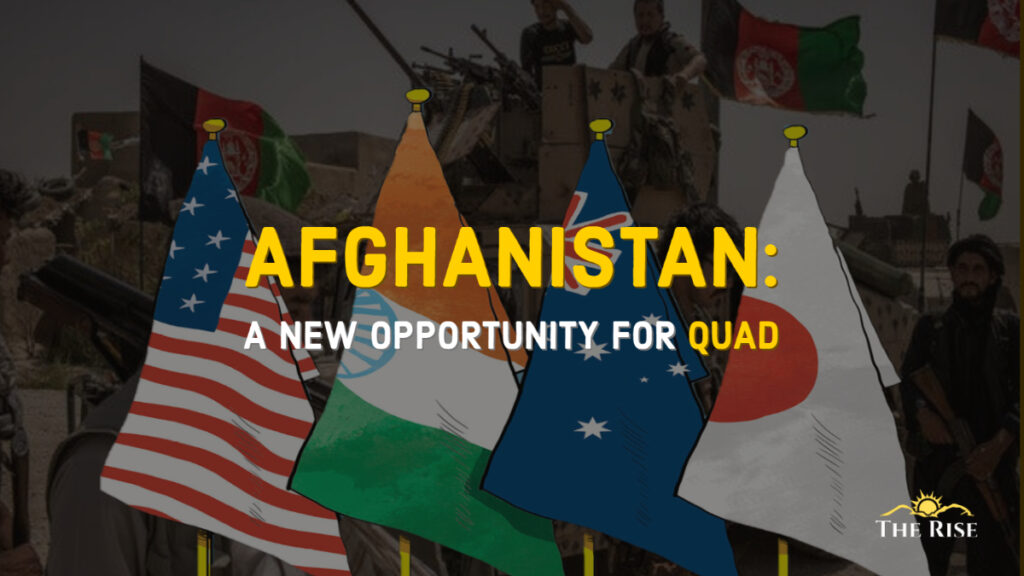

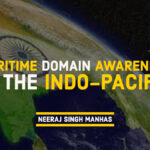

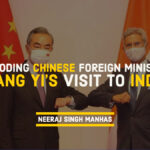
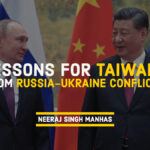


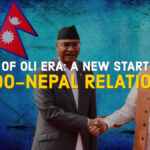




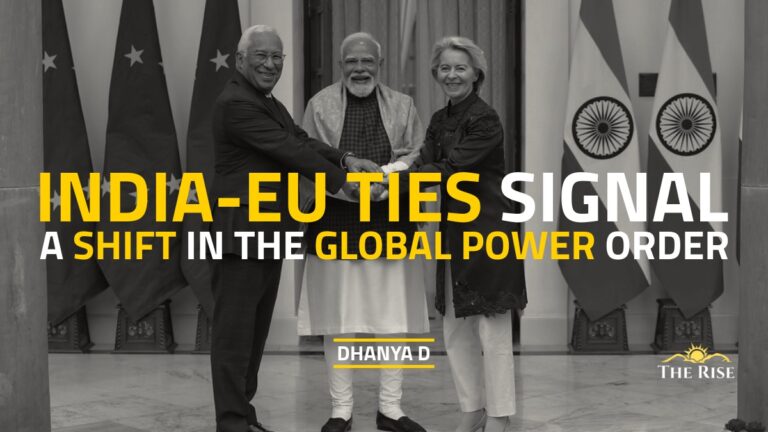
Pingback: United States, NATO, and the Taliban: Analysis of Politics - TheRise.co.in
Pingback: Achilles' Heels of China in 2022 - TheRise.co.in
Pingback: In Search of Allies: Washington and the World - TheRise.co.in